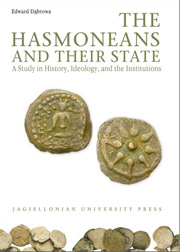Book contents
- Frontmatter
- Contents
- Introduction
- Abbreviations
- Part I Judea under the Hasmoneans (167–63 BCE)
- Part II The Institutions of the Hasmonean State
- I The Ruler
- 1 The Royal Priesthood or the Priestly Monarchy
- 2 The Priesthood
- 3 The Kingship
- 4 Succession
- 5 The Royal Family
- 6 The Court
- 7 The Capital City
- 8 The Palace and the Baris
- 9 Propaganda and Self-Presentation
- II The State
- Part III Society
- Conclusions
- Bibliography
- Index of Personal Names
- Index of Place Names
- Index of Ancient Sources
- Electrum - Volumes Published
- The Hasmonean State
2 - The Priesthood
from I - The Ruler
Published online by Cambridge University Press: 05 September 2014
- Frontmatter
- Contents
- Introduction
- Abbreviations
- Part I Judea under the Hasmoneans (167–63 BCE)
- Part II The Institutions of the Hasmonean State
- I The Ruler
- 1 The Royal Priesthood or the Priestly Monarchy
- 2 The Priesthood
- 3 The Kingship
- 4 Succession
- 5 The Royal Family
- 6 The Court
- 7 The Capital City
- 8 The Palace and the Baris
- 9 Propaganda and Self-Presentation
- II The State
- Part III Society
- Conclusions
- Bibliography
- Index of Personal Names
- Index of Place Names
- Index of Ancient Sources
- Electrum - Volumes Published
- The Hasmonean State
Summary
Questions relating to the office of high priest of the Jerusalem temple in the Persian and Hellenistic periods have long been of interest to scholars. Many opinions and hypotheses they have voiced concern especially the political aspect of the position. This is primarily because some high priests played a major role in the tumultuous events which occurred in Judea late in the 3rd and throughout the first half of the 2nd centuries BCE. This helped form the now quite commonly accepted view that high priests played an important secular role as political leaders. Yet studies published in recent years whose authors attempted a comprehensive analysis of historical evidence relevant to high priesthood paint a picture that differs considerably from the received wisdom. Such studies have shown that, in the light of the sources, many common beliefs and opinions about the status of high priests before the Hasmoneans call for thorough revision if not outright rejection. Conclusions thus arrived at are not irrelevant to the way the Hasmoneans themselves are viewed.
The starting point in discussions of the role and importance of the office of high priest of the Jerusalem temple at the time it was held by the Hasmoneans is usually the year 152, when Jonathan became the first of them to attain it. Such discussions would, however, be incomplete without duly considering the whole sequence of events which had begun more than 20 years previously and in which the main protagonists were high priests of the same temple.
- Type
- Chapter
- Information
- The Hasmoneans and their StateA Study in History, Ideology, and the Institutions, pp. 107 - 111Publisher: Jagiellonian University PressPrint publication year: 2009



